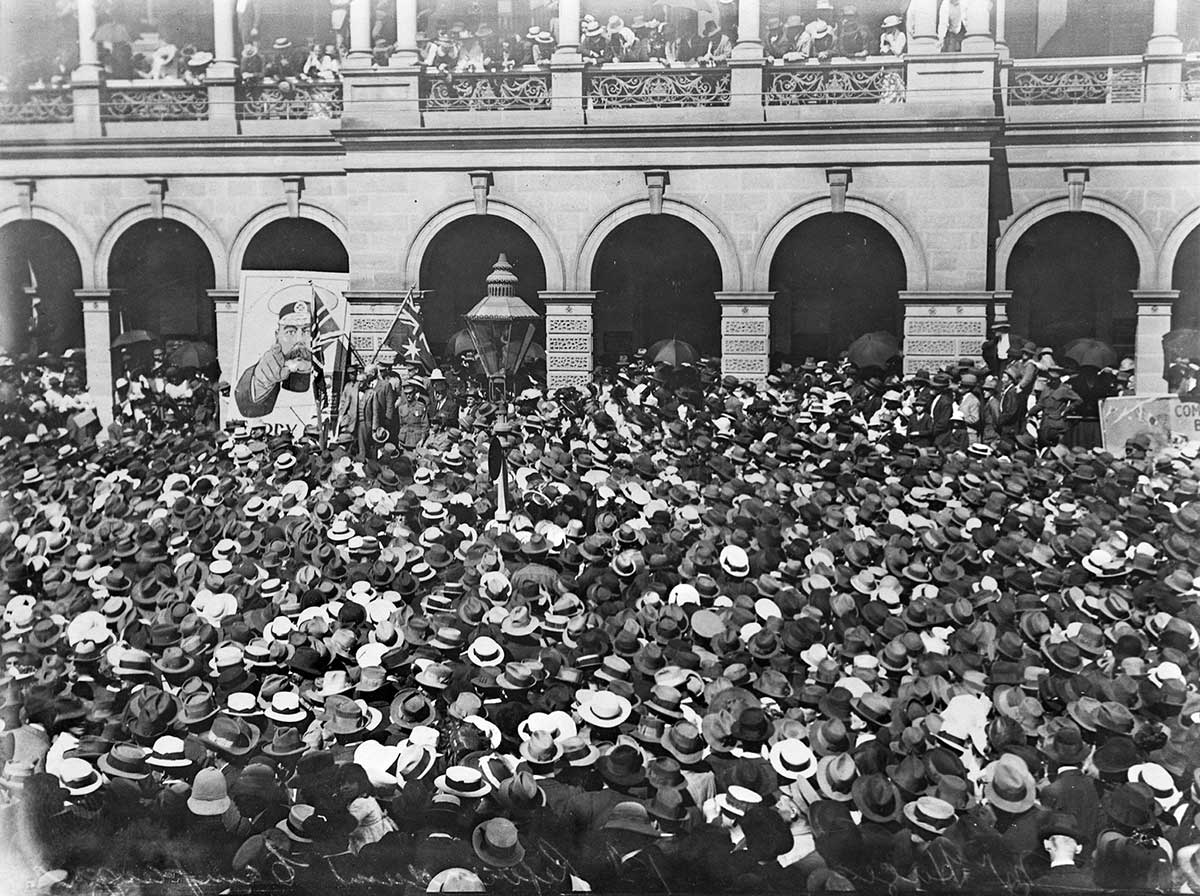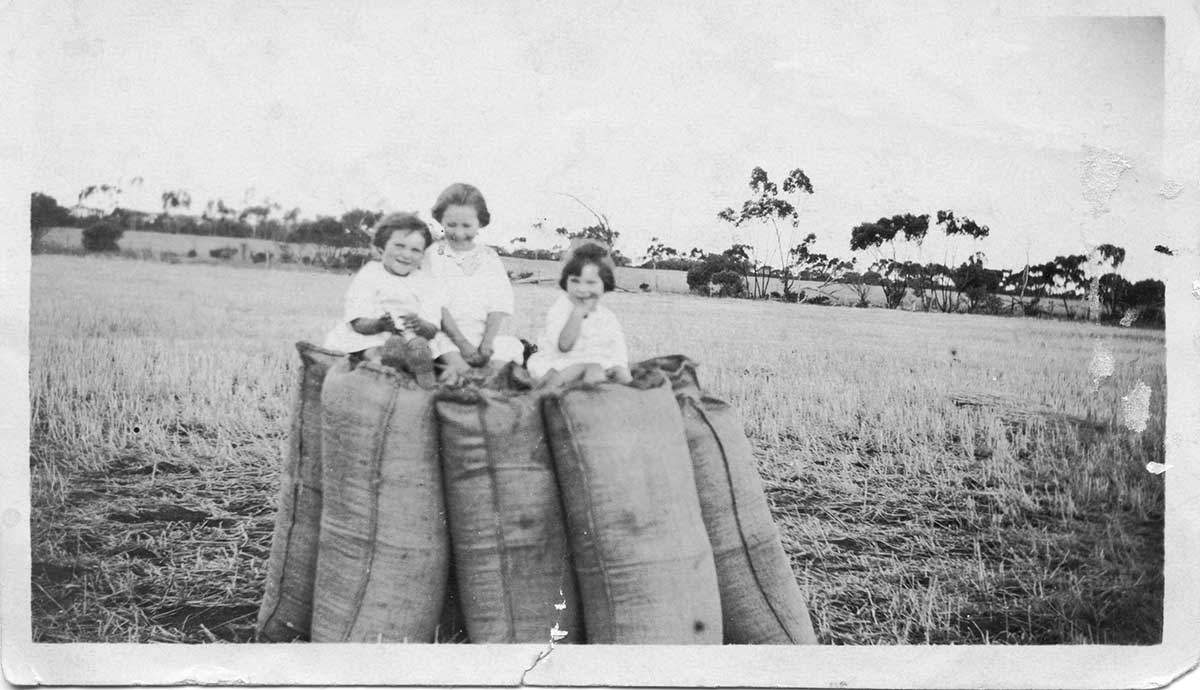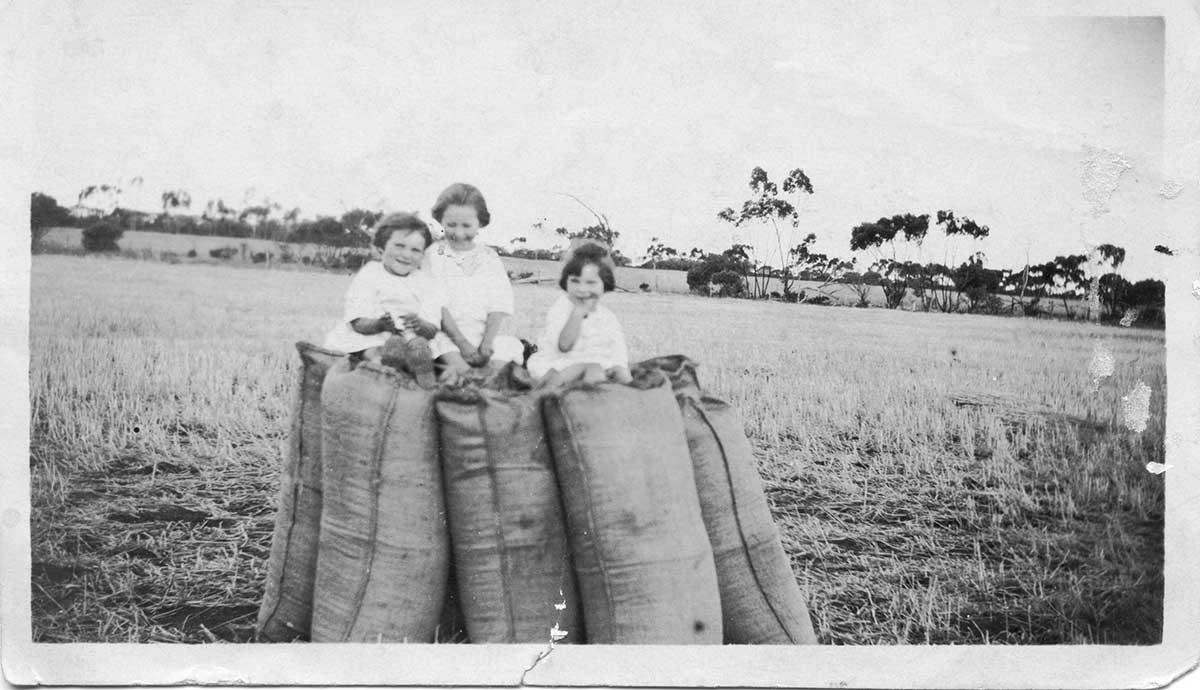Learning module:
War correspondents
War correspondents
19. Forcing them to fight?

Marcus McLay is based in the Trades Hall Building, just north of the centre of Melbourne. It’s a cold, wet and windy day when you arrive to meet him on the steps of the building.
‘Come inside cobber’, says Marcus. You enter the building. It is messy but lively. Lots of people are coming in and out of the building — workers mostly. A few people in suits — union officials you guess — and many more in work clothes. Some are carrying banners, others are in the process of making them.
‘We’re planning a protest for this weekend, rallying against bosses keeping our wages too low. You should join us!’
You state that as a journalist, it is important to stay neutral. He leads you to a room where you are able to conduct the interview. It is dingy and smells like stale tobacco smoke.
You begin the interview.
‘Look mate,’ he says, ‘the AIF — that’s the Australian Imperial Force — was one of the few voluntary armies in the whole war. But that wasn’t enough for the government, oh no. When the casualty lists kept growing in the newspapers and that hell-on-earth war carried on way longer than anyone thought, fewer and fewer people volunteered. That’s when the government decided to try and force people to fight.’
He looks disgusted as he says that last line. He pulls out a packet of cigarettes and offers you one. You decline. He lights up.
‘Billy Hughes, the Prime Minister, was the one who said we should have conscription. Can you believe it, a Labor Prime Minister? S’posed to be the friend of the working man. So we had a referendum — well it was actually a plebiscite even though people tend to call it a referendum. That’s when everyone in the country votes to decide whether or not to change a really important law. The 1916 referendum was rejected; the people didn’t want conscription. So they had another one in 1917. Same result. It was a pretty close vote both times though, I’ll admit. Boy did those votes split the country! Some real uncomfortable times, for sure.’
He smiles.
‘But you’re not here to listen to my one-sided view. We were in the fight against conscription from the start so I’ll try and sum up the different sides for ya.’
He moves a pile of papers from a ledge, takes a grubby towel and wipes a part of the wall which turns out to be a blackboard. He divides the board into two halves and writes:
| Pro-conscription groups | Anti-conscription groups |
|---|---|
| Political parties (except for Labor) | Labor party (except Billy Hughes for some reason) |
| Businesses | Trade unions (all the workers you see in this building) |
| Newspapers like the Age (your lot) | The Catholic Church |
| The Protestant Church | Many ‘working class’ people |
‘So there you have it. See if you can see what each of those sides have in common. If you want my opinion, it’s a bunch of imperialists and capitalists on the pro-conscription side! Make up your own mind though.’
He gives you a moment to copy down his table. He rubs it off and draws another one.
| Arguments in favour of conscription | Arguments against conscription |
|---|---|
| Australians have a duty to Great Britain, as a former colony. | You can’t force someone to go to war and kill people. |
| There should be ‘equality of sacrifice’. If there was conscription, people from all walks of life would have to go to war, not just the working classes. | Even if there was conscription of people’s lives, there still isn’t conscription of wealth. Rich people should be taxed more to support the war effort, before we send more workers to their death. |
| There aren’t enough soldiers for the war effort just from people volunteering. | There are too many dead already, why send more? |
| Australia’s reputation as a strong country is at stake. | There wouldn’t be enough men in Australia to do all the work if they were sent to war and that would open up the country to cheap imported labour. |
| Other allies in the war had introduced it (like Great Britain and New Zealand). | Conscription is harming Australia by creating divisions between people — those who want it and those who don’t. |
This is fairly balanced considering how strongly Marcus was against conscription at the time, you think to yourself.
You thank him profusely for his time.
‘See you at the protest this Saturday?’
‘Perhaps’, you respond.
Your task
Your boss wants you to summarise the different perspectives on the conscription debate.
In an uncharacteristically serious moment, Mr Callister gave you some wise words before you left his office: ‘Your view will differ about historical events or participants depending on your background, where and when you grew up, your class, whether you are a man or woman, your education, your religious or political beliefs and so on. When you look at historical writing, you need to consider what background might contribute to the author’s perspective. You must understand the motive they had for writing what they did.’
You find this assignment hard so you go and have a cup of tea with your old mentor, Emma Pratt.
She says, ‘Look at the information in the tables.
What do the groups for conscription have in common?
What do the groups against conscription have in common?
Are they the same types of people?
Do you think they might share some of the same opinions about other things?
Do they live in similar places, have similar jobs, similar income...?’
She continues, ‘What do the arguments for conscription have in common?
What do the arguments against conscription have in common?
Do both sides have things in common?’
From the tables given above, summarise the two perspectives by completing the table below (one has been completed for you to show you how to do it):
You file your story. You take the weekend off from reporting. As Monday morning rolls around you are walking to the Age office when a man grabs you by the arm. ‘You’re that ace war reporter for the Age, aren’t you?’ You are reluctant to say yes to a person who has grabbed you on the street.
‘I’ve got a news story for you. It’s about a massive government failure. The government doesn’t want to talk about it but I can give you a scoop if you want?’
‘What is it about?’ you ask.
‘The government spent all this money trying to set up soldiers on the land when they came back from the war. Total failure if you ask me. Buy me lunch and I’ll tell you all about it.’
He seems a bit batty, but sincere. This definitely sounds like a story your boss would like to run, so you agree to buy him lunch and follow him to a nearby restaurant. Go to 20.







